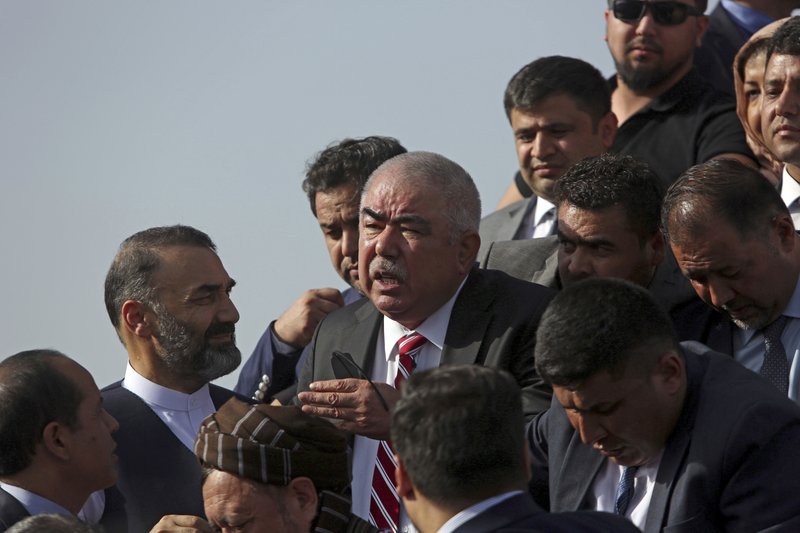KABUL, Afghanistan -- A suicide bomber killed 14 people in Afghanistan on Sunday, narrowly missing the country's vice president, security officials said.
Najib Danish, a spokesman for the Interior Ministry, said the blast occurred near Kabul International Airport shortly after the convoy of Afghan Vice President Abdul Rashid Dostum had just left the airport. Dostum, a former Uzbek warlord, had been living in Turkey for more than a year.
Top officials with President Ashraf Ghani's administration, along with a crowd of supporters, were at the airport to welcome Dostum on the tarmac and to applaud as he disembarked and headed toward an awaiting car. The suicide bomb exploded moments after Dostum left the airport.
Danish said the 14 people killed in the attack included civilians and troops and that 50 others were wounded. Neither Rostum nor his entourage were harmed.
The Islamic State extremist group's Kabul affiliate claimed responsibility for the attack on its Amaaq News Agency website, claiming it had killed and wounded more than 115 people.
In a statement from the presidential palace, Afghan President Ashraf Ghani strongly condemned the attack.
Dostum left Afghanistan in 2017 after the attorney general's office launched an investigation when an ally turned political rival accused Dostum of beating him, imprisoning him for two days and ordering his rape. Dostum has denied those charges, calling them part of a conspiracy against him.
Dostum had been considered to be living in exile. It was not immediately clear whether Dostum will face any charges now that he has returned.
"The judiciary in Afghanistan is an independent body and will carry out its duties and responsibilities as it deems appropriate," said an official, speaking on condition of anonymity because he was not authorized to comment on the issue.
Dostum, accused of war crimes committed after the fall of the Taliban government in 2001, has also been criticized by the United States for human-rights abuses.
But after the explosion on Sunday, Dostum focused on the future.
"I pay greetings to all Afghans," Dostum said during a ceremony held at his office in Kabul, where he vowed to help Afghanistan find a way out of its 17-year war.
"I, as the first vice president, consider peace with the Taliban more important than any other duty," he said, adding that he planned to meet with Ghani today.
Ghani picked Dostum as his running mate in 2014 to secure support along the country's northern provinces near the Uzbekistan border. In the past, however, Ghani referred to Dostum as "a known killer."
Northern Afghanistan most visibly rallied for Dostum's return. In recent weeks, demonstrations shut down local government offices in what appeared to be a mounting threat to stability in that part of the country while Afghan forces struggle to fend off Taliban and Islamic State fighters advancing in the area.
Those rallies grew larger after Afghan soldiers arrested a political protege of Dostum's in Faryab province -- district Police Chief Nizamuddin Qaisari -- for threatening to kill government officials.
Earlier this month, a video showed Afghan soldiers kicking Qaisari's wounded and handcuffed bodyguards after a brief battle leading to the arrest.
Ghani, under pressure from international donors to both restore stability and enforce his government's rule of law, arranged for Dostum to resume his role, regardless of the charges against him.
The official reason for Dostum's departure to Turkey was that he was undergoing unspecified medical treatment. Presidential spokesman Haroon Chakhansuri said in a statement that "the treatment is completed now" and that Dostum is ready to resume office.
Dostum has returned from exile before. In 2009, then-President Hamid Karzai forced Dostum to leave for Turkey over allegations that Dostum beat, abducted and ordered the sexual assault of another political rival, Akbar Bai.
Dostum was allowed to return a few weeks before that year's elections, throwing his weight behind Karzai to help him win another term.
Information for this article was contributed by Rahim Faiez and staff members of The Associated Press; and by Antonio Olivo and Sharif Hassan of The Washington Post.
A Section on 07/23/2018
